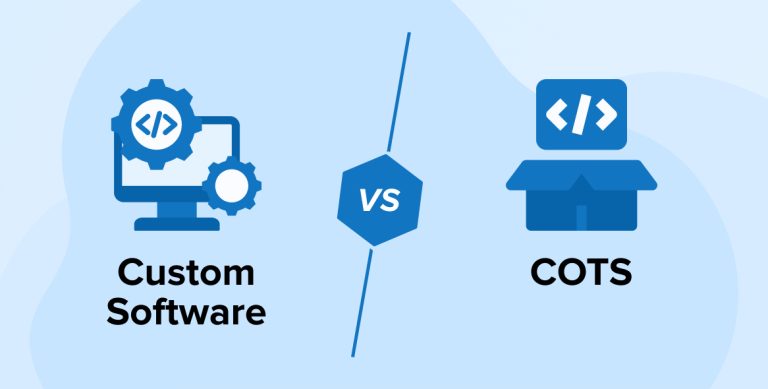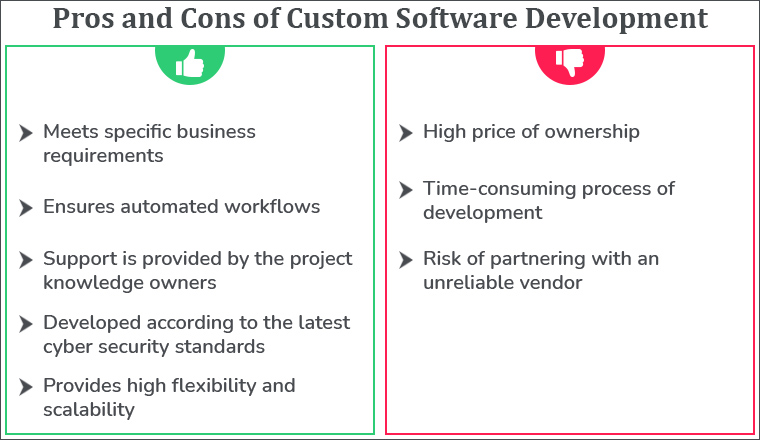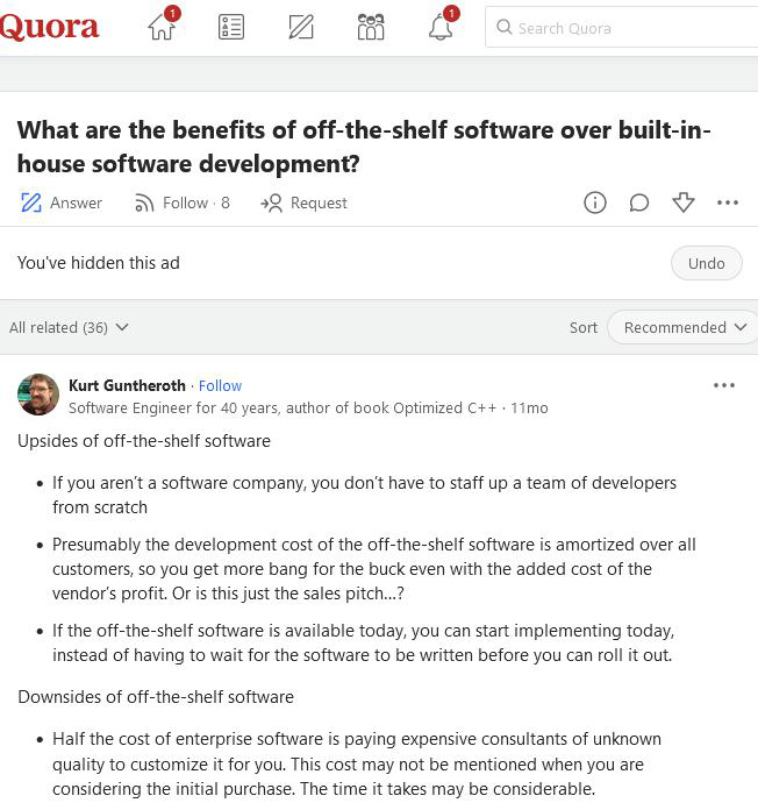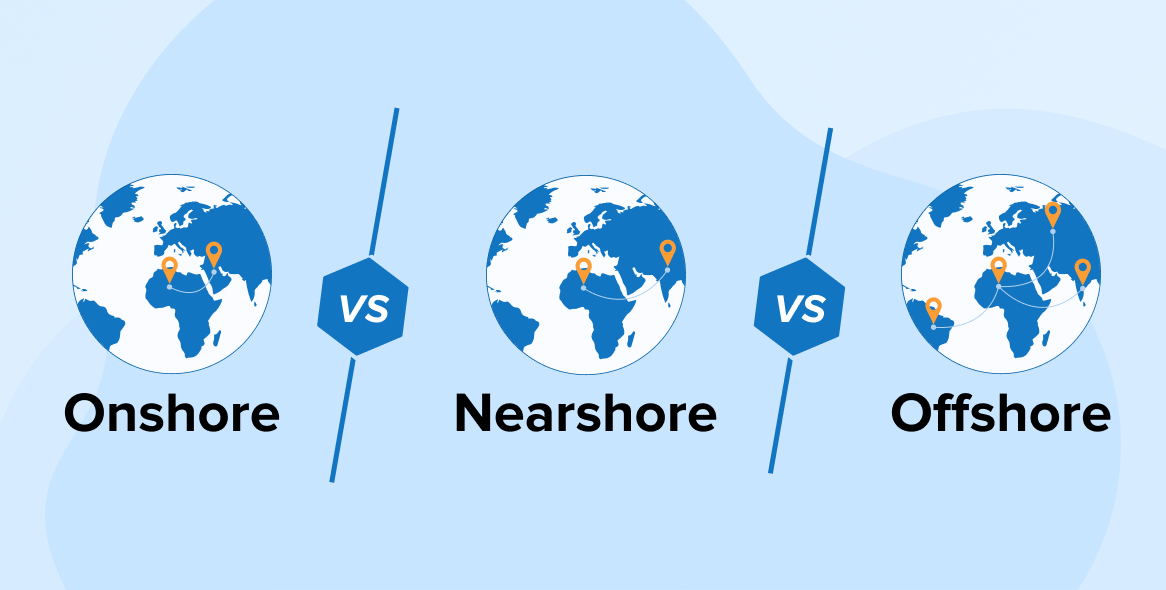
We live in a world full of options. Option to buy, option to sell, option to collaborate, and whatnot. Every corner we turn, there are innumerable options available for businesses to collaborate and leverage the service. In the wake of such competitive environments, every business is trying hard to win customers with their unique business solutions but not all businesses succeed. Speaking specifically of the Software development industry, the reason for lagging behind can be “Customization”. Not every business considers customization a priority. Some choose to cling to COTS software (commercial off-the-shelf applications).
Long years ago, Software development was considered a method to improve the efficiency of businesses against their administrative employees putting long tedious hours into mundane tasks. Now that the times have changed but the agenda is the same. Software is still developed to improve the efficiency of the organization and both types of software development methods- Custom Application Development and Off-the-shelf software solutions directly serve the purpose.
Every business has its unique business needs and not every COT Software can fulfill these needs. On their way to boosting productivity, businesses continuously innovate and improve their business processes by leveraging best-in-class technology solutions to develop customized business applications. At a point, every business is stuck to choosing between Custom software and Commercial off-the-shelf applications. Hence with this blog, we will get deeper into the roots of Custom Software Development, how it is different from regular off-the-shelf Applications, with an elaboration on the pros and cons of custom software development.
1. Custom Software Development
Custom Software Development– as the name suggests is a bespoke software development method used to develop apps as per the tailored business needs. This type of software development process is aimed to serve a particular set of business requirements of a typical organization. At inception, it starts with the basic functionalities, and later the additional functionalities can be added which is not possible in COTS. The intent of creating such customized software is to enable businesses with specific needs developed by third parties or in-house-team which restrict the business from reselling it.
Custom software is not developed like generic apps or in bulk with broad offerings. The generic cots solutions can be frustrating at times because of lack of speed, lack of control over features and functionality, and in addition, doesn’t deliver impactful results on business deadlines and might hinder the overall business performance.
Custom applications are designed in a way that upgrades the current level of application performance and maximizes the output. Their implementation allows businesses to reap maximum rewards from the app developed with customization, offering minimal risks and beneficial outcomes. For organizations with unique or varying needs -Custom Software development is an ideal option and businesses can narrow down their request based on specific parameters such as cost comparisons, usability, need enhancements, feasibility, and security. Not ignoring the benefits that off-the-shelf apps offer, let’s explore why businesses opt for off-the-shelf apps and what benefits it is capable of offering.
Check Out latest ongoing trend in custom software:
2. COTS – Commercial-Off-The-Shelf Software
In the software development industry- Change is indispensable. A growing forward-thinking company needs to become adaptive to change. Organizations in the IT sector embrace technology change because it keeps them ahead with a competitive advantage. Generally, businesses are more inclined to use off-the-shelf software. For most of us who aren’t aware of what is COTS, here’s a simple explanation of what exactly COTS means. COTS is also known as Ready-made applications or Packaged apps that are already available in the market for use. Examples of such off-the-shelf applications are Adobe, Microsoft applications, etc. These types of generalized applications are used for commercial use and sold to hundreds and millions of users. However, off-the-shelf applications are a conventional and simplistic way to address business needs without any hassle.
Considering the best available examples are POS- Point of Sale system or ERP- Enterprise planning system. These are the most visible examples of off-the-shelf applications used by different industries. There are many benefits as mentioned:
- COTS is relatively affordable on a budget and economical for businesses where there are a large number of users. If COTS is a cloud-based software then it is not purchased with a hefty investment cost, instead, there are some monthly charges that are availed by the users.
- COTS is highly preferred where users are higher in number which saves their ongoing development costs.
- COTS has defined features with easy-to-access user facilities.
- COTS offers app development support that is easily available and there are experts who would guide you on usage or complications.
Check Out latest ongoing trend in custom software:
3. Advantages and Disadvantages of Custom Software Development

Dynamic businesses need to upgrade their software now and then, and the only options available are either through Custom software product development or off-the-shelf applications. Both these types have their features and benefits to offer. To choose between the two, you must know all the sides of the applications- the good and the bad. The reason why we are discussing the pros and cons of bespoke software development and off-the-shelf application software is to provide a larger picture for businesses feeling ambiguous in choosing between the two. Here we have discussed both the capabilities and limitations of both types of applications.
Advantages of Custom Software Development
- As the name suggests, custom software is developed considering specific business challenges in mind and will thrive through all the critical business scenarios with profits. It is designed to solve problems and will serve the purpose.
- Custom software can be modified at any given instance as per evolving business changes.
- The partner custom software company is always available to support custom software development.
- Custom software offers a Superior User experience.
- Integration is possible and feasible for all custom-developed applications.
- Other than just developing once, this customized application can be enhanced during the evaluation phase, and for more feasibility of the application, you can add features to the existing application.
- As mentioned, it can be easily modified as per the need. If there are some technological advancements or software upgrades, then they can be easily incorporated into custom software apps.
- Custom software simplifies your regular processes and offers a competitive advantage over peer firms.
- Custom software development can be termed as a one-time investment with no per-user cost and no extra license fees.
Disadvantages of Custom Software Development
- The cost of custom software development is higher than COTS.
- Innovation takes time and so sometimes it may cost you higher than the estimated time and budget.
- Thorough testing is required to check bugs after each added feature.
- The biggest roadblocks one can face in custom software development depend on the kind of business or third-party company you choose to outsource. If the chosen custom software development firm has less expertise, then the developed app will be inefficient and unproductive.
- If you want a quick fix to a specific business problem, then developing a customized app is not an efficient option. Many small or large complexities should be addressed through custom app development or else it would turn out to be a costly investment.
- Developing a custom application from a third party will make businesses dependent on them.
- There wouldn’t be any ownership rights, even if there is a minute issue, it needs to be taken to the third-party app developer to resolve.
- Higher time invested and delayed the process. There can be situations where the technology vendors support you 24*7 and with their conceptual understanding, you may resolve issues faster and easier. It’s how you choose your development vendor.
4. Advantages and Disadvantages of Commercial off-the-shelf Software
The packaged software solution also known as off-the-shelf applications is a preferred choice by most individuals as well as organizations of varied sizes and domains. This is a quick fix for all business problems and is adopted because of the benefits it offers to the Software development Industry.
Advantages of Commercial off-the-shelf Software
- COTS is produced in mass, so it is comparatively cheap and easy to run. Depending on the user and their use of the application, sometimes the application may cost higher maintenance charges.
- COTS is relatively inexpensive and affordable to buy and implement.
- Simpler to use, easy to maintain, sophisticated and secure.
- Minimum training Cost and approachable community support.
- Saves time, money, and resources on product development & testing.
- User manuals are easily available online.
- COTS is universally accepted and so in case of any glitches or barriers, there are industry experts readily available to help.
- COTS does not require resources to spend time on training as it comes with a manual easy to understand and decode.
- Trusted packed products are used and implemented by many online and you can also check for more options of similar types of products, their rates, and reviews online.
Take a look to this quora answer which perfectly summed up pros & cons of COTS software.

Disadvantages of Commercial off-the-shelf Software
- Packaged off-the-shelf applications are risky to use because of the hidden costs involved. Initially, you may feel it is a one-time investment which it is not. It comes with a recurring cost that involves customization costs, up-gradation costs, etc.
- Not all off-the-shelf apps come with modification options hence it hinders the growth of the organization and it will become technically laggard.
- For instance, if the application is upgradable and is upgraded too with new features and functionalities but now if it isn’t compatible with the existing browsers or Operating systems then the up-gradation will demand some extra costs for advancing the systems.
- Off-the-shelf is the same system used by the competitors and so it is equally challenging to gain a competitive advantage.
- Since COTS is developed keeping a mass audience in mind so most of the functionalities of COTS will not be useful for specific users.
- Very little scope for innovation in Software development.
- In case of requiring support, the response time may vary for each individual depending on the community approach for help.
5. Final Thoughts
Choosing the right process for software development is a daunting task for businesses and often they end up choosing incompetent ones. Small or large-scale companies face the same confusion. Custom Software companies have experience in the software development business and hold technical prowess in developing custom software applications. We would be happy to assist businesses with what best fits them in terms of their business requirements. Feel free to get in touch.




Most ideal choice depends upon our requirements, but making the wrong selection can be both costly and time consuming.When making the selection, Our prime concern should be the efficiency with which software serves our company and other partners in the best possible way.Custom software offers some advantages which can be beneficial for longer terms. Custom software can serve startups better than shelf software.
Companies are dependent on software solutions to smoothly run their enterprise and make informed business decisions. The selection between build or buy has been a major decision making point in the software system and cannot be taken lightly.Your blog has seriously helped me decide on whether to buy or build with a clear assessment on each particular need and a broad understanding of what existing software solutions can and cannot do.